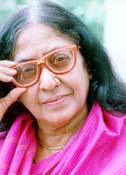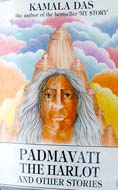The Rediff Interview/Kamala Das
'Poetry died within me'
 They say, behind every successful man, there is a woman. But
don't you feel it is the other way round. Even now behind every
successful writer, there is an encouraging and supporting husband.
Is it necessary to have such a man in a female writer's life?
They say, behind every successful man, there is a woman. But
don't you feel it is the other way round. Even now behind every
successful writer, there is an encouraging and supporting husband.
Is it necessary to have such a man in a female writer's life?
If my husband had not been sympathetic to some degree, I would
not have been a writer at all. I know of women who decided to
become writers or artists, but then change their mind later because
of the interference from the husbands. Mine not only turned away
but welcomed. He took some pride in my writing which was a great
help to me.
How did you evolve and grow yourself as years went by, from
a young bride to a wife and a mother? How did these roles or changes
in life help you grow as a person and creative writer?
Growth is certainly gratifying because you need to have many
avatars, avataramin one life. I had to experience, I had to see
things, I had to hear things and I was in a hurry. Another point
is, Shobha, we might grow old and not know it. Others know it.
Others are conscious of the fact that I have aged. I am not. Within
oneself, one doesn't feel aged at all. Within oneself, one
is ageless. That'll remain so, ageless.
Did those roles you had to play help you or not help you in
your creative writing?
It helped me. Sometimes consciously, deliberately, I would even
adapt a kind of role because I wanted to write about such a person.
So I would act out the role before I wrote the story about such
a person.
Do you think like that person?
I would be that, more or less. I would think like that, act
like that. If you were to ask me, which of my characters is the
strongest, I would say myself. When I wrote about myself, I brought
out a very strong character, and that character cannot get rubbed
away so soon!
Is there a part of yourself in all your creations?
Sure. I certainly believe that a creator leaves a part of himself
or herself in the creation. You can't escape that. You remain
there, trapped within your creation and that is the most vital
part in creation. So certainly in my poetry, in my stories, in
my paintings, a part of myself is there.
Did you ever feel that you should have been somebody else,
doing something else in your life?
I must have felt. When I was about twenty, I felt I should
have been a doctor. I should have tried, I felt. Later on, I accepted
my role as a writer, settled down to it.
Do you enjoy yourself being a writer?
I think so. I have enjoyed myself. Now, not so much. Now I
don't get enough time to devote myself to writing. I have to write
columns, I have to meet people. If you become well known, you
naturally have visitors all day long, and my energy is frittered
away in talking to strangers. So I have very little time for creative
writing.
When did you decide to become a professional writer, which
is quite different from creative writing?
I found it difficult to mange with my husband's salary, so
he said I start selling stories. Then I became a good contributor
to the family income. Later on when my husband retired, he told
me that I should stop thinking of writing poetry. It doesn't sell
anyway. I should write things that sell. Short stories, may be.
Or long stories or columns. Columns are the most paid.
 When he spoke about the need to get someone to support him, it is only
with some guilty conscience that I could scribble verse. So, I
gave up poetry. Poetry died within me because I cannot think without
feeling guilty that I am wasting time, and it's not going to help
my husband.
When he spoke about the need to get someone to support him, it is only
with some guilty conscience that I could scribble verse. So, I
gave up poetry. Poetry died within me because I cannot think without
feeling guilty that I am wasting time, and it's not going to help
my husband.
Didn't you feel sad?
Yes, I felt sad. I do feel sad. Almost every year, I am invited
to some place or the other in the world. And when I go abroad,
I realise that I am accepted there only because I am a poet. Then
I feel I should strengthen my poetry. But financially I was very
weak.
But your husband worked in very high positions inside India
and also outside. He might have had a very good salary.
We never could save (money). Probably because he had the wrong
kind of wife. I believe in giving away gifts and money to people
who are in need. So I never could keep any money. I never could
become rich; may be I was not good enough or clever enough.
|





 They say, behind every successful man, there is a woman. But
don't you feel it is the other way round. Even now behind every
successful writer, there is an encouraging and supporting husband.
Is it necessary to have such a man in a female writer's life?
They say, behind every successful man, there is a woman. But
don't you feel it is the other way round. Even now behind every
successful writer, there is an encouraging and supporting husband.
Is it necessary to have such a man in a female writer's life?
 When he spoke about the need to get someone to support him, it is only
with some guilty conscience that I could scribble verse. So, I
gave up poetry. Poetry died within me because I cannot think without
feeling guilty that I am wasting time, and it's not going to help
my husband.
When he spoke about the need to get someone to support him, it is only
with some guilty conscience that I could scribble verse. So, I
gave up poetry. Poetry died within me because I cannot think without
feeling guilty that I am wasting time, and it's not going to help
my husband.